We launched a new class in December, Intro to AI for Marketers. Our plan is to make this class a recurring 30-minute, webinar-format class to reach the marketing masses so people can learn very quickly what marketing AI really is, and how folks can get started on their journey if and when they’re ready.
As I do for all of our webinars, I clean up the video for post-show access, create a shorter version for public consumption on YouTube, and transcribe the video for blog and social content.
This time, I used several AI tools to speed up and improve the process. Most of the time didn't even know AI was assisting me, as it was seamlessly baked into the technology. All I knew was that it made my job and life easier.
Here is my process. While not exactly a scientific and ingenious process, hear me out. And note: This is NOT a sponsored post. Descript, Zoom, and YouTube don’t even know I’m writing this post.
1. Download the video from Zoom.
About an hour after the class ended, Zoom sent me an email notifying me that the cloud recording of the class was available. I logged into Zoom and downloaded the video.
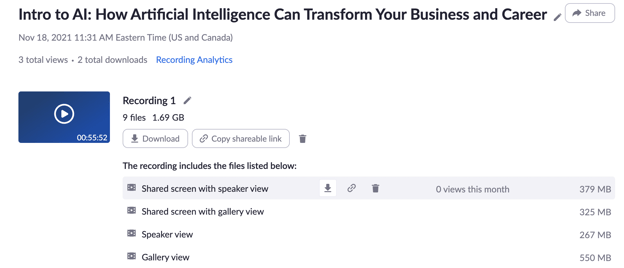
2. Upload the video to Descript.
I clicked on File > New Project in Descript, and uploaded the Zoom .mp4. In a few short minutes, a few things happened.
One, the video was transcribed here. You can see there are still some minor and easily fixable errors in the transcription. Two, Descript gave me an opportunity to identify the voices in the video so the transcription could include names. In this instance, AI was able to identify the difference between me and our CEO and Founder, Paul Roetzer.
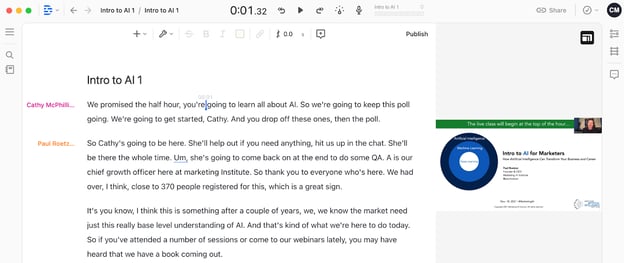
3. Clean up and edit the full video.
Editing is hard work, especially for the untrained. But, in Descript, I was able to edit the video by highlighting the text I didn’t want in the video, and simply hit “cut.” Descript edited the video for me.
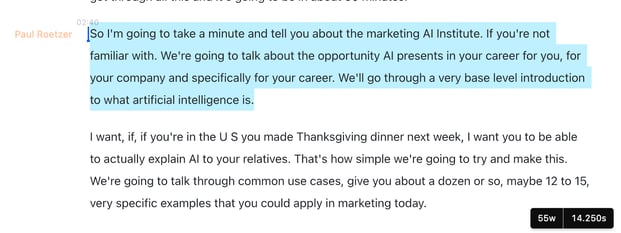
4. Export the full video to our internal drive.
When I was finished editing, I exported the video to our drive for internal use. Descript offers a number of formats and export options.
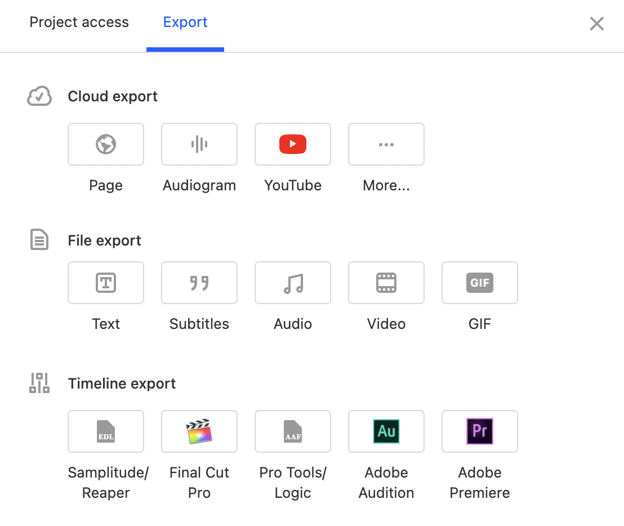
5. Create a second project in Descript for snippet video.
As any good content marketer will tell you, repurpose, repurpose, repurpose! I created a second project within Descript so I could create a two- to three-minute video of a highlight from our class. This allows us to use it as both a nice piece of educational content, but also a teaser and promotional piece for our future Intro to AI classes. Once I completed this, I exported this directly into YouTube.
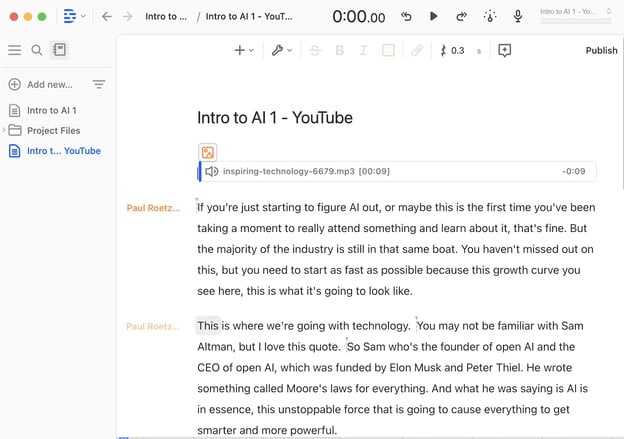
6. Wait for YouTube to match up the transcription to Paul’s voice.
I went to YouTube, added in a video description, added in a thumbnail image, and then cut and pasted in the transcription of the snippet video. I then let YouTube do its magic. It lined up the transcription and Paul’s voice to a T. The only edit I needed to make was at the end of the video, it left the last sentence Paul said over the CTA slide I added to the end of the video. I needed to edit that in the transcription so the CTA was visible. Other than that, it was aligned perfectly.
Adding closed captions to the video is important so our content is more accessible. We plan on using this feature for all future videos.
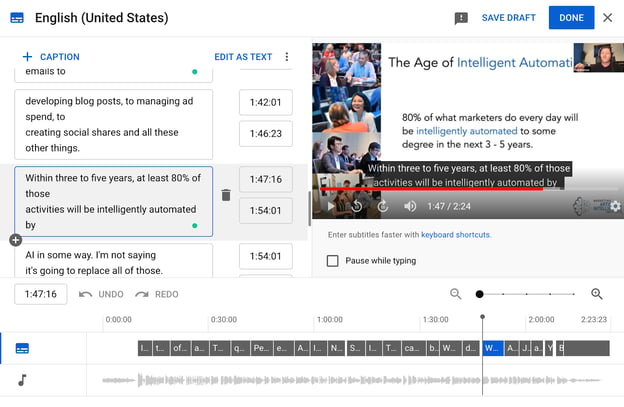
Once this was all set, I hit publish on YouTube.
Where was the AI?
- Descript transcribed the video using AI.
- I was able to edit the video cutting text vs. cutting video.
- YouTube matched up the transcription to Paul’s voice.
This is a very, very basic use of artificial intelligence in marketing, but I think it highlights the fact that we’re using AI in our day-to-day marketing lives already. Just think of the possibilities if we proactively look for ways to save time with AI-powered marketing technologies, and how that time could better be used.
I piloted another program recently where another tool, copy.ai, wrote promotional copy for MAICON, our Marketing AI Conference. I entered a 100-word description of MAICON and provided a URL, and AI did the rest. I needed to edit some of the copy, and all of it wasn’t perfect, but it was a great start. It also gave me a new perspective and fresh language to use when talking about our event. Who knows if the language copy.ai generated will resonate better with a customer?
Using AI-powered tech for these two projects saved me probably a good day’s worth of work. I made a conscious effort to use the time I saved to put them to good use. I scheduled phone calls with customers, I did outreach on LinkedIn, and I spent some time looking at our analytics and setting up reporting.
I implore you to sign up for a future Intro to AI class. Invest 30 minutes to learn a little more, shake off some of the fear and apprehension you have, and learn how you can better use the technologies in your stack.
Sign up for our next Intro to AI session today! And connect with me on LinkedIn, as I’d love to continue this AI journey with you.
Cathy McPhillips
Cathy McPhillips is the Chief Marketing Officer at SmarterX and Marketing AI Institute


-2.png)